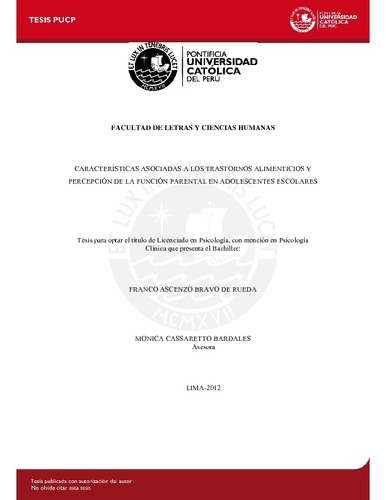| dc.contributor.advisor | Cassaretto Bardales, Mónica de los Milagros | es_ES |
| dc.contributor.author | Ascenzo Bravo de Rueda, Franco | es_ES |
| dc.date.accessioned | 2013-03-14T01:48:40Z | es_ES |
| dc.date.available | 2013-03-14T01:48:40Z | es_ES |
| dc.date.created | 2012 | es_ES |
| dc.date.issued | 2013-03-13 | es_ES |
| dc.identifier.uri | http://hdl.handle.net/20.500.12404/4432 | |
| dc.description.abstract | El objetivo general de la presente investigación fue establecer la relación entre la percepción de la función parental de adolescentes escolares y la presencia de características tanto psicológicas como comportamentales asociadas al riesgo de desarrollar trastornos alimenticios. El universo de estudio fue conformado por estudiantes escolares, tanto hombres como mujeres que cursan de segundo a tercer grado de secundaria de un colegio particular de Lima. Se empleó el Inventario de Trastornos de la Conducta Alimentaria EDI-2 (Garner, 1998), así como la prueba “Adolescent Family Process” (AFP), instrumento diseñado por Vazsonyi, Hibbert, y Snider en el 2003. Los resultados evidencian la existencia de asociaciones entre las dimensiones de la función parental y la presencia de características asociadas al riesgo de desarrollar trastornos alimenticios en adolescentes escolares, destacando la importancia de la comunicación con la madre y el padre. Además, se encontraron diferencias a partir de las variables sociodemográficas como el sexo y el IMC reportado. | es_ES |
| dc.description.abstract | The main objective of the present investigation is to establish the relation between the
perception of parenting in adolescent students and the presence of psychological
characteristics, as well as behaviors associated with the risk of developing eating
disorders. The sample was conformed by 111 scholar students, both boys and girls that
were studying in second to third year of secondary in a private school of Lima. The
Eating Disorder Inventory EDI-2 (Garner, 1998) was used, as well as, the test
"Adolescent Family Process" (AFP), that was designed by Vazsonyi, Hibbert, and
Snider in 2003. The results showed relations between parental function and specific
characteristics associated to the risk of developing eating disorders. Some of them were
the parents communication, support and friends approval from parents. Finally, there
were also found diferences by sociodemographic data, for example, gender and body
mass.
Key words: Eating disorders, parenting, EDI-2, AFP. | es_ES |
| dc.language.iso | spa | es_ES |
| dc.publisher | Pontificia Universidad Católica del Perú | es_ES |
| dc.rights | Atribución-NoComercial-SinDerivadas 2.5 Perú | * |
| dc.rights | info:eu-repo/semantics/openAccess | es_ES |
| dc.rights.uri | http://creativecommons.org/licenses/by-nc-nd/2.5/pe/ | * |
| dc.subject | Trastornos de la nutrición | es_ES |
| dc.subject | Padres | es_ES |
| dc.subject | Educación secundaria--Investigaciones. | es_ES |
| dc.title | Características asociadas a los trastornos alimenticios y percepción de la función parental en adolescentes escolares | es_ES |
| dc.type | info:eu-repo/semantics/bachelorThesis | es_ES |
| thesis.degree.name | Licenciado en Psicología Clínica | es_ES |
| thesis.degree.level | Título Profesional | es_ES |
| thesis.degree.grantor | Pontificia Universidad Católica del Perú. Facultad de Letras y Ciencias Humanas. | es_ES |
| thesis.degree.discipline | Psicología Clínica | es_ES |
| renati.advisor.dni | 09491245 | |
| renati.advisor.orcid | https://orcid.org/0000-0002-4880-6092 | es_ES |
| renati.discipline | 313026 | es_ES |
| renati.level | https://purl.org/pe-repo/renati/level#tituloProfesional | es_ES |
| renati.type | http://purl.org/pe-repo/renati/type#tesis | es_ES |
| dc.publisher.country | PE | es_ES |
| dc.subject.ocde | https://purl.org/pe-repo/ocde/ford#5.01.00 | es_ES |






